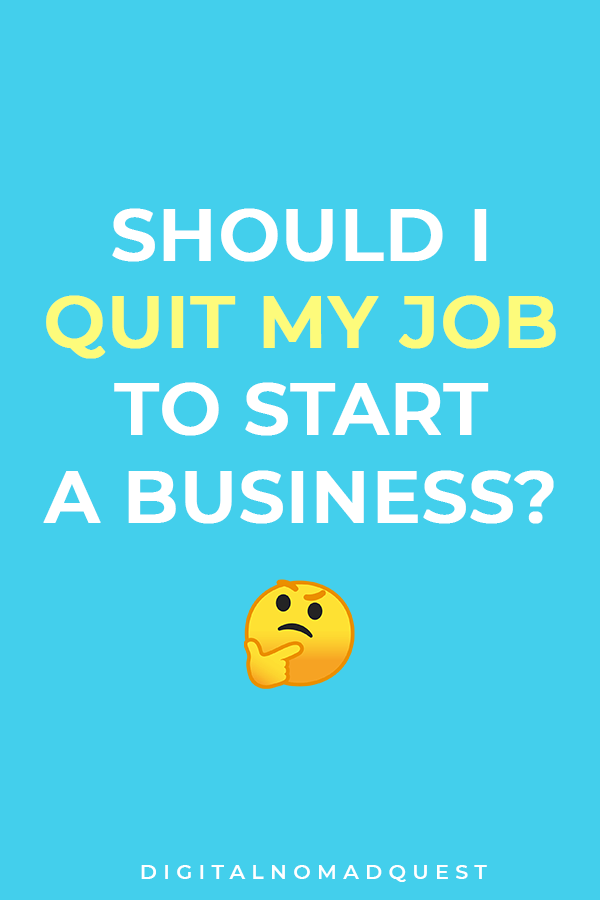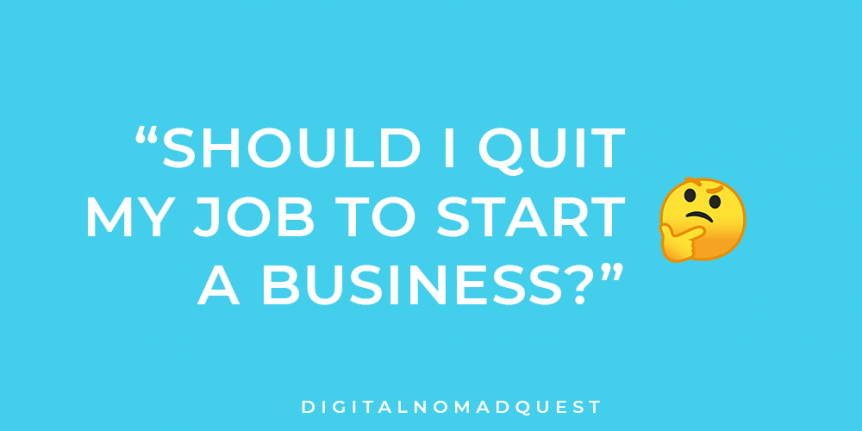I’ve heard this question asked a lot over the years:
“Should I quit my job to start a business?”
I’ve dealt with the exact same predicament myself. Before I started nomading, I was debating on whether or not I needed to quit to start building passive income. And though I did end up taking this route to pursue my entrepreneurial endeavors, I’ve also come back to working full-time while having my hustles on the side. Because I’ve experienced both ends of the spectrum, I’d like to discuss my perspective on what I think the pros and cons are for each side.
“Should I Quit My Job to Start A Business?” – What to Consider
As you can tell, I’m not a 100% yes for any one path when it comes to quitting your job or not. In fact, I think the answer to this question really depends on many different factors that you would need to gauge for yourself.
If you’ve been trying to figure out whether or not to leave your job, here are some questions to answer if you haven’t already. I’d get a pen and paper or a Google Doc to type your answers. This questionnaire will get you going on what feels like the right choice for you.
1. Do you love your job?
I think this is an important question to ask. My parents used to tell me that happiness is a luxury. And loving your job is a privilege. I agree that these are things to be grateful for; however, I believe that we all deserve happiness and a career worth smiling about. The thing is we spend 40 hours a day or more working a day job, and if we’re living for weekends and dreading Mondays, there seems to be an issue. As time is short on Earth, it really doesn’t make sense to hate your job when it takes up so much of your life.

So do you actually get up every day with excitement to go to work?
If the answer is no, then it’s time to brainstorm an action plan. Regardless if you have a business idea worth pursuing or not, it is worth thinking about changing your situation if you’re not happy with your current job.
2. How much money have you saved up?
I’m sure you’ve already been thinking about this. You want to know how long you can last with the money you’ve saved up. You’ll need to assess your financial situation by calculating your net worth including liquid assets and investments. To do this, I recommend Personal Capital to track your net worth and debt online. It is free to sign up and it automatically updates your account balances.
It’s important to not only calculate the amount of money you’ve saved but to also figure out your average expenses per month. You can try getting the average expenses from your last 6 months. Then figure out how long you can last with the current amount of money you have. This will help you better assess if you need to wait a few more months to quit or if you can do it right now.
3. How long have you been working at your position, what’s your educational background, and what are your qualifications?
This 3-part question is mainly to gauge how robust of a resume you have. If you were to quit your job now, do you have the qualifications and educational background that shows how competent you would be in case you need to come back to a job in the future? Do you feel you can provide a ton of value for companies?
Also, jotting down how long you’ve been working at your position really shows: A) if a break from a job feels justified and B) if you could be perceived as a job hopper vs. a more stable employee, which could potentially matter in job interviews.
4. How much risk tolerance do you have? How strong is your dedication? Are you the type who normally follows through and executes on things they say?
By asking these questions, you’ll understand two things: your own ability in a high pressure environment and your dedication to your business idea. If you’re super passionate about your project, that’s a good sign. And it’s also a good sign if you’re the type who really gets things done.
Don’t let these questions scare you if you’re not the type to tolerate risk and execute. It just means that you’ll need to work on these aspects as taking the entrepreneurial route is not easy at all!
5. How much time and money will your business idea require?
Do you need to outsource work? Acquire funding? And is this a 6-month project or a 5-year endeavor? It will be important to understand how much time and money your business idea will require in order for you to assess your situation.
6. What would your action plan be if you quit your job?
Now that you’ve figured out what your business idea will require, map out your action plan month-to-month and what milestones you’ll need to hit to get your business up and running. This will let you see more clearly whether or not you’ll need to stop full-time work in order to succeed or not.
7. What life responsibilities do you currently have?
Do you need to support a family? Your parents? Or are you a single person with no obligations? This helps to gauge if your actions of quitting would impact others detrimentally or if they would be totally fine.

8. What is your reason for quitting?
Is there something unbearable about your job that you need to quit ASAP? Or is your work-life balance totally off where it would be too difficult to work on your business idea on the side? And finally, is there some inexplicable calling pulling you towards quitting your job and pursuing your entrepreneurial endeavors?
These are important to understand, as perhaps you’ll find you’re able to balance a side hustle if you just allotted your time better, or you’ll realize it really is impossible to get other business ideas going while working full-time. Or maybe, you’ll find that you’re not trying to make a decision based on logical reasoning, and that you just want to jump in head first based on a feeling calling to you. I’m a believer in callings and purpose – so sometimes this requires intuition vs. logical reasoning.
The Pros and Cons of Working Full-time with a Side Hustle vs. Being a Full-time Entrepreneur
Now that you’ve answered the above questions, I want to explore both options of working full-time on a project vs. working on a side project. Here I will list the pros and cons to both sides to the equation, based on my own experience.
Becoming a Full-time Entrepreneur
Pros
- You can use the fear of failure / being broke (depending on your scenario) to drive you
Jumping in head-first without a safety net may actually create that ability to execute in a fearful situation. It just depends on your personality. Check out The Power of Broke for some information and solid examples about this. The book talks about how the fear of being being broke can actually motivate the crap out of you and help you think of creative solutions to drive results.
- Work remotely and travel the world if you’d like
When I quit my job, I knew I didn’t want to sit at home working on my business ideas. To be honest, maybe my work ethic would have been better if I did. But I imagined if I stayed in the Bay Area to work on online businesses while all my friends were working, I would constantly second guess my decision to quit, and I’d get bored. That’s why I ended up traveling the world for about 2 years. And when thinking about it financially, you could, for example, work in Chiang Mai, Thailand where expenses usually range from $600-1000/month (as rent for me was only $150/month). My point is you have more of the OPTION to leave whenever you want, whether or not you want to take it. When working a full-time job it’s much harder to up and leave when you feel like it.

- Ability to network internationally
This is in addition to the point above. You’re going to have more time to network with other professionals, and if you’re able to travel the world as well, you’ll be able to network internationally. You can even partner with manufacturers and suppliers around the world for your business.
- Investing more of yourself into your business may force you to work harder
Because I invested so much of myself into my 2 year nomading journey and my business, it forced me to work harder because I had this feeling of “I didn’t do this for nothing!” This feeling was slightly different from the FEAR of not hitting goals. It’s like investing a lot into a relationship – it makes you more connected and want to work hard on it rather than let go.
- More opportunity to focus
This is obvious. Quitting your day job means more time to focus on your business.
Cons
- May go broke
When you cut off your income source you run the risk of going broke, especially if you’re not diligent with tracking your finances, and you’re not seeking other income sources while doing the entrepreneurial route. If you’ve saved up and thought of different action plans, you should be okay. I personally saved up a decent amount and held multiple freelancing positions so that I could make a slow transition towards setting up my online businesses.
- Will have to make your own schedule (can be good or bad)
While I was nomading, I found it kind of difficult at times to make my own schedule. It can almost be comforting to follow a rigid schedule from an employer to take the weight off you. If you’re not good about creating a daily schedule and routine, it can be easy to waste away your days.
- Will have a lot of time to think (can be good or bad)
There was something about having so much time on my hands that made me a little bit too prone to overthinking. If you don’t have a problem with overthinking, you should be fine. I was constantly wrapped in thoughts of “am I taking the right path” and “am I doing well”? It can be a good thing or a bad thing depending on your personality.
- Uncertainty
When you quit your job and become an entrepreneur, you’ll have to deal with even more uncertainty in life. You won’t know if you’re ever going to succeed as there are no guarantees. But you could actually view this as a good thing, to really train yourself to let go of expectations and be okay even when nothing’s assured. It might be a great way to challenge yourself, to see if you can handle not knowing what’s going to happen.
Side Hustling while Working Full-Time:
Pros
- Ability to invest your income back into your business
Having a steady income along with my passive income has been nice because I can put money back into my businesses or courses/training without hesitation. Depending on what you need for your business, it might actually be advantageous to work full-time and remove that financial burden. In my case, I find I’m quite risk averse and occasionally fearful about spending/investing money, and that can actually be a huge barrier when you’re trying to reach new heights with your business. I’m a lot better with it now that I’ve seen results and more cashflow coming in. But if you’re just starting out I can see why being too careful with your money can actually be a bad thing when it comes to building a business. The money you put in might actually take you to the next level, but if you’re too afraid to do it you’ll never know. Because of this, it’s necessary to see what you actually need more of – money or time – when it comes to your business idea. Because maybe it’s actually better to get that extra income if you need that money for your startup, and it’s really dependent on your scenario.
- The regular schedule can help with life balance (at least it did for me)
As I got back into working full-time while holding my side hustles, I actually found the regular 9-5 schedule helped. Every day I knew I had to go into work for a certain period of time, and I knew that I had the rest of the night to get my shit together with my online businesses. However I know that some jobs require way more hours and are overwhelming where you’re not able to balance a business on the side. So this advantage that I put down as a pro may not be applicable to your situation and it really depends.
- May feel motivated to work hard during the hours you can after work (work efficiently)
I remember when I was a full-time entrepreneur and digital nomad, I would sometimes worry that I wasn’t working efficiently enough and could get the same amount of work done on my businesses if I had a full-time job. Because for me, I actually feel motivated to work on my side hustles after work as I consider how I only have a specific window of time to work on my own projects. This deadline seems to put pressure on me to work a lot more effectively.
This might not be applicable for everyone as again, you may have a job that requires way more hours and creates a larger toll on your brain and body. But for me, my day job motivates me to work efficiently during the hours I have to myself.
Cons
- Less time to work on business ideas
You’re going to have less time for your side hustles if you’re required to work 40 hours a week at a day job. This is quite self explanatory. But the amount of work you get done is dependent on your work ethic and action plans.
- Can get tired after full-time work
If you’re planning to work on your own businesses after working full-time, you may find yourself completely exhausted while trying to get stuff done. And on top of all of that, it can become challenging to balance a life that is still concerned with keeping a healthy body and mind and maintaining relationships.
- If you have a time constraint on building a business, side hustling while working a day job could minimize the possibility of success
People advocate going all-in on one project, and there’s a reason why. Gary Keller talks about focusing on one thing, because if you really want to move the needle on something you’re going to need to put all your dedication into one project. It’s likely that if you have multiple things to do, your brain will constantly be scattered on what you need to do next. If you have all the time in the world to build your business, focusing all your attention on your entrepreneurial endeavor may not be as necessary. But if you have a goal to get your business up and running within a short time frame it could be worthwhile to examine if you need all your focus on one project.
Conclusion
Ultimately, it’s hard for me to say what direction to go as every person’s situation differs. I’m currently happy with working full-time and having my side hustles. Who knows if that will be the case in the future. What are your thoughts on this? Let us know in the comments below!


